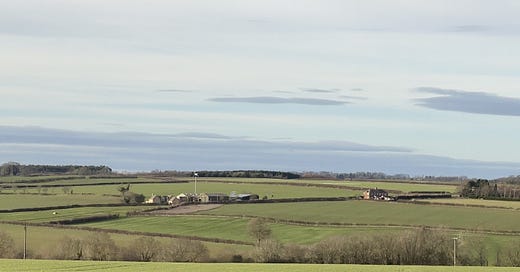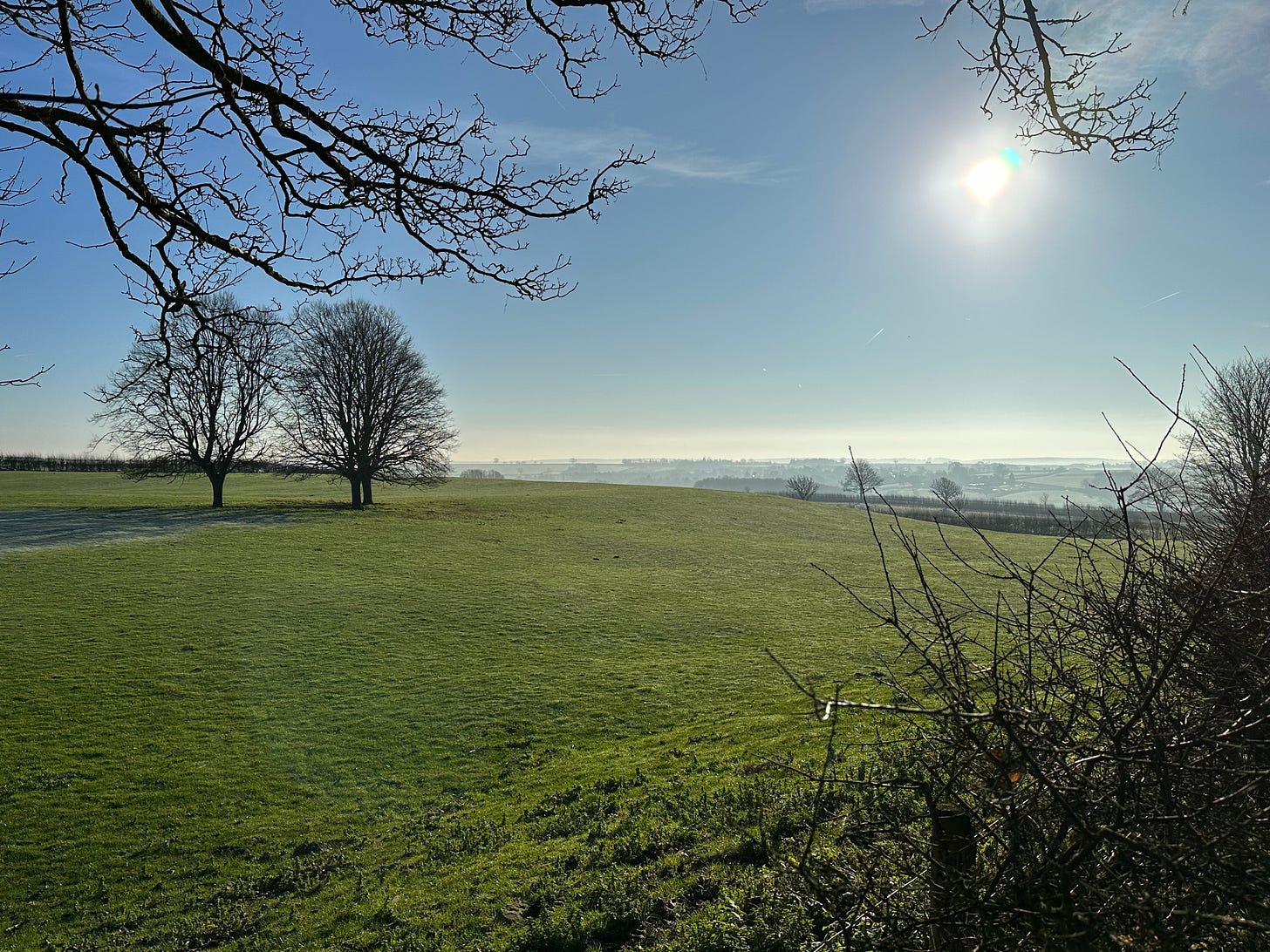Is Staveley Solar Farm truly sustainable?
There are plans to turn 80-hectares of farmland into a solar farm. Good for the planet and local people, or a self-serving scheme to profiteer under the guise of sustainability? Here's my opinion...
Sustainability is sometimes defined as a three-legged stool, supporting people, planet and profit.
In business, it is referred to as the triple bottom line. If balanced, everyone, and everything, can benefit.
The problem with Staveley Solar Farm, a proposed development on 80-hectares of High Rutland arable fields and pasture between the villages of Pilton, Morcott and Wing is that it prioritises one factor above all: profit.
It’s one of four solar farm proposals for Rutland that could eventually cover more than 2% of the county’s land area – way beyond the 0.3% national target set by government to meet net zero climate goals.
But it’s not just the scale that’s worrying to many – it’s the concern that private companies are profiteering at the expense of the local community and, potentially, the environment.
That’s because the electricity generated here would be supplied almost exclusively to Anglian Water, a large, private company which is 85% foreign owned and whose shareholders include the Abu Dhabi Investment Authority.
Instead of powering local homes, 10-15% of electricity generated will go to Wing Water Treatment Works and 75-80% to Anglian Water’s wider estates. Cheaper electricity will simply help the company cut costs and boost profits.
Good news for the firm’s shareholders (Anglian Water paid out a £92m dividend in 2021, according to the Financial Times).
But there are concerns about the actions of water companies. This week, The Times newspaper reported:
“Water companies will impose the largest rise in household water and sewerage bills in almost 20 years, despite mounting concerns over issues including illegal sewage spills, leaks and executive pay.” (Households face highest water bill increase in decades, February 2)
In October, the BBC reported that Anglian Water had been fined £1.2 million after admitting causing pollution in three counties.
And in January, the Environment Agency took Anglian Water to court after 6 million litres of raw sewage was discharged into a Northamptonshire river killing 5,000 fish. The company was fined half a million pounds.
England is the only country in the world with a fully privatised water system – and it’s questionable whether the system is working to the benefit of people and the planet.
So before we rush to sell off more natural resources for the direct benefit of large private companies such as Anglian Water, perhaps we should stop and reconsider if there is a better way of generating green energy in a truly sustainable way, directly benefiting people and communities and recognising the value of farmland and the countryside in relation to food security, nature and wellbeing.
Unfortunately, the local planning authority, Rutland County Council, appears to have been caught napping. It has already agreed with Bluestone Energy Ltd, the front end developer, and Anglian Water, that no Environmental Impact Assessment is necessary for this 80-hectare development. This is a travesty.
Meanwhile, Bluestone Energy and Anglian Water are making bold PR statements, including that this development will enhance biodiversity.
They also claim they are, “Helping Rutland farmers to diversify their businesses.” In this case, diversification will likely be profitable in the extreme. Based on land size and typical rates being offered by energy companies, the 200 acres could be worth £200,000 per year, and many millions over a 40-year lease.
Other local farmers and landowners have turned down speculative approaches to lease land for solar over environmental and community concerns.
Cynically, Bluestone Energy and Anglian Water, along with their planning consultants Pegasus Group and London PR agency Copper Consultancy, have branded this development Staveley because they wish to create the false impression that it is an industrial site, ecologically poor, low value. Evidently, this is not the case.
Staveley was the name of the mining company that extracted ironstone for around 50 years from 1919, sending it by rail to its steel factory in Staveley, Derbyshire.
But legislation rightfully restored the landscape to its historic agricultural state. It is High Rutland, an area of distinct geology and geography, and flocks of lapwings, a once common farmland bird now on the RSPB’s conservation red list, can be seen here.
The mistakes of the past should not be made again.
By falsely painting the picture of a brownfield site, the consortium is revealing its own true intention of industrialising the landscape.
What is truly unsavoury, though, are the solar panels themselves. As a representative from Bluestone Energy admitted at last week’s public consultation in Wing Village Hall, the solar panels will most likely be made in China.
And this is where Bluestone Energy and Anglian Water face real problems in presenting this as a sustainable development.
Accusations of forced labour in relation to the manufacture of solar panels in China have been confirmed in a recent report by Sheffiled Hallam University. It states:
· 95% of solar modules rely on one primary material – solar-grade polysilicon.
· Polysilicon manufacturers in the Uyghur Region account for approximately 45% of the world’s solar-grade polysilicon supply.
· All polysilicon manufacturers in the Uyghur Region have reported their participation in labour transfer programmes and/or are supplied by raw materials companies that have.
· In 2020, China produced an additional 30% of the world’s polysilicon on top of that produced in the Uyghur Region, a significant proportion of which may be affected by forced labour in the Uyghur Region as well.
To be clear, the manufacture of solar panels in China is directly linked to slavery.
Is this something we are willing to accept? Is this what sustainability really is?
Electricity might be cheap to generate from solar, but it is costing the earth – and the lives of people.
No one that I met at the well-attended public consultation at Wing Village Hall last week was against renewable energy; quite the opposite.
But people do want the government – which announced its Environment Improvement Plan this week, confirming our status as an appallingly nature-depleted country – and Rutland County Council to step up and put clear guidance in place in relation to solar farms.
We can achieve our net zero targets and renewable energy requirements on time and in the right way – but we need a clear plan, not the vague strategy the government has so far proposed.
We can meet the 0.3% land target, but without having to sacrifice agricultural land that we may require for food production if China and Russia continue on their threatening geopolitical paths.
The motivation for this solar farm is not doing the right thing for the environment and the planet – it is profiteering, at scale, for Bluestone Energy and Anglian Water and its foreign owners. There are no direct benefits to the communities and people whose lives will be negatively impacted. Worse still, on the other side of the planet, people are being enslaved and the environment exploited to fuel a greedy new energy gold rush here on England’s green fields.
People, planet, profit.
This development is, by definition, unsustainable.
• The above is my opinion, citing reliable news and academic sources.







The land between Wing and Pilton is a big nesting site for lapwings which are a red list bird on the critically endangered species list. On a recent walk I saw at least 40 birds there. Their sites should be conserved as they will not return to an area that has been disturbed. The environmental impact of the proposed solar farm is huge and this should be followed up with the RSPB.
Sooner or later the world’s citizens will wake up enough to understand what this is really all about.
We’re trying to make that day come as soon as possible.
https://envmental.substack.com/p/sacrificing-humanity-on-the-green-16c
We wish the UK would learn from Germany’s “Energiewende”. Your Charlaticians do not yet appear ready or capable. So, you’ll all suffer until they do or replace them.